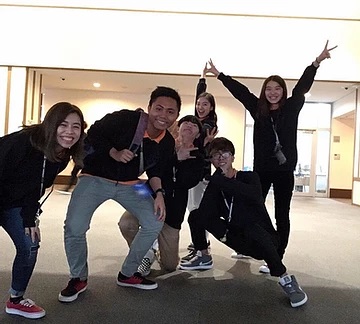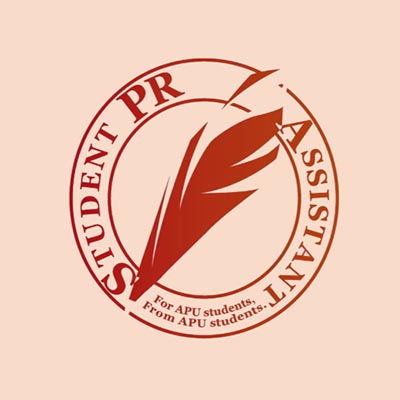Hello everyone. In this article series, Job Hunting Tips for APU Students 2020, we asked students who have successfully found employment for the secrets to their success, including their thoughts behind job hunting as well as their activities. Take a big step into life after university and find the answers that are right for you from interviews with upper-year students. I hope job hunting leads to success for all of you.
Job offer in the real estate sector 濱口にな(HAMAGUCHI Nina)さん
In the fourth part of the series, we talked to Ms. Hamaguchi who has received a job offer in the real estate industry.
Profile
Country: Japan
College: College of International Management (APM)
Graduation year: March 2021
Languages studied in university: English, Chinese
Activities during university:
1st year: Academic camp, JAC, summer camp for learning Chinese, JBCC winner
2nd year: RA
3rd year: Overseas internship, BCC runner up, FIRST Program TA, study abroad (1 year)

ー Question 1: When did you start job hunting?
I started looking for employment around December of my third year. Because I was studying abroad, I started working on my approach for the career forum. In February of my third year, an upper-year student edited my resume and personal PR. I had been gradually thinking more and more about job hunting since starting university. In my second year, I went to a job hunting camp. I could not do a summer internship because I was focused on preparing for studying abroad in the fall of my third year. During my overseas internship, I gave a presentation at a government office in Thailand. Furthermore, I applied for jobs online using a job recruiting website until finally I received my current job offer in May of my fourth year. I have had many adventures, and my experiences working hard towards what interested me helped a lot during my interviews.
ー Question 2: Why did you choose the real estate industry?
I began developing an interest in real estate around January of my third year. It started during the time I was job hunting when I realized how much I enjoy thinking about my own living space, such as how I arrange my room and so on. Also, I was moving once every six months or so for RA duties or studying abroad and had a real sense of the importance of spaces. Because of that, I thought I would be happy with a job that involved the places where people live and call home. I felt that my ideal workplace would be one where employees are evaluated by performance rather than age, and where everyone is highly motivated. For those reasons, I decided to join a company in the real estate industry with a results-oriented policy valuing individual targets. I was a little nervous about the results-oriented approach, but I wanted to prioritize having a motivating job where I felt continuously challenged.

ー Question 3: What did you focus on for your interviews?
Not being nervous. I felt it would be a shame if I could not fully convey who I was. During interviews, I tried to convey my experiences and who I am as well as I could so that I would be satisfied with the result whether I did or did not pass the interview. I thought the interviewer was assessing whether I was a person they would want to work with and whether I was someone they could trust. I didn’t focus on getting a good result. Instead, I focused on conveying myself as a person whom they could accept without reservations.
ー Question 4: Could you tell us what techniques you used to ensure you could say everything you needed to say without being nervous?
I used two techniques.
The first was recording practice interviews. I recorded myself responding to interview questions I expected and evaluated myself objectively. I did not have many friends who were looking for employment while studying abroad. Therefore, I had to job hunt on my own, and this method proved effective.
The second was writing a description of myself that I wanted to convey to the interviewer on a piece of paper.
I wrote down what I hoped the interviewer, who would be meeting me for the first time, would learn about me and what impression I hoped they would take away from the interview. To be more specific, I drew my face in the middle of the page and wrote my strengths and examples of those strengths around it. By clarifying what points I wanted to make sure to convey, I was able to answer any question without shifting from my focus. In the interview, I concentrated on having the interviewer develop an image of me based on that picture of who I am and what skills I possess. I recommend this to help you remember these things visually when your mind goes blank.
ー Question 5: What types of people did you ask for advice when job hunting?
I got advice from my parents, upper-year students at university, and people already in the workforce. Talking to people already working felt especially important. Describing myself from scratch so they understood me was good practice for my interview, and people with actual work experience could give me insights I had not considered myself, which was very valuable. In talking to people with jobs, I discovered that it was more important to have the interviewer learn who I am than to develop skills for succeeding in interviews. I made sure that I did not miss any opportunities to talk to people in the workforce, for example by participating in Alumni Association events in my host country while studying abroad and contacting people who were already on the career path I planned to pursue.
ー Question 6: Is there any advice you received during job hunting that really struck you?
The advice that everything has meaning. I was told that it is important to take in everything that happens in life, give it meaning, and interpret it correctly. While I was job hunting, I realized that there is no need to over-prepare by thinking, “This is something I want to do now, but what if it changes someday?” I learned that it is important to choose what you feel is right for you in that moment.
ー Question 7: Finally, do you have a message for all the lower-year students who are just starting their job searches?
Create opportunities to meet and talk with as many people as you can.
While it is important to think about your own life and future on your own, it is also important to explain yourself to others and get their feedback. Verbalizing your thoughts is good practice for expressing yourself during an interview.
Right now, I am also studying hard for the registered real-estate broker exams. I hope you are able to create opportunities to talk to all sorts of people. Good luck!

My next post will be an interview with a senior colleague who has received a job offer from GAFA! Enjoy!













